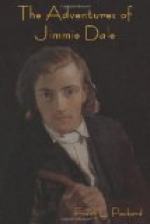His eyes met those of a heavy-built, coarse-featured man, the chewed end of a cigar in his mouth, who stepped from behind the bar, carrying a tin tray with two full glasses upon it. It was Bristol Bob, ex-pugilist, the proprietor.
“How’re you, Larry?” grunted the man, with what he meant to be a smile.
Jimmie Dale was standing in the doorway of a passage that prefaced a rear exit to the lane. He moved aside to allow the other to pass.
“’Ello, Bristol,” he returned dispassionately.
Bristol Bob went on along down the passage, and Jimmie Dale shuffled slowly after him. He had intended to leave the place by the rear door—it obviated the possibility of an undesirable acquaintance joining company with him if he went out by the main entrance. But now his eyes were fixed on the proprietor’s back with a sort of speculative curiosity. There was a private room off the passage, with a window on the lane; but they must be favoured customers indeed that Bristol Bob would condescend to serve personally—any one who knew Bristol Bob knew that.
Jimmie Dale slowed his shuffling gait, then quickened it again. Bristol Bob opened the door and passed into the private room—the door was just closing as Jimmie Dale shuffled by. He had had only a glance inside—but it was enough. They were favoured customers indeed! It was no wonder that Bristol Bob himself was on the job! Two men were in the room: Lannigan of headquarters, rated the smartest plain-clothes man in the country—and, across the table from Lannigan, Whitey Mack, as clever, finished and daring a crook as was to be found in the Bad Lands, whose particular “line” was diamonds, or, in the vernacular of his ilk, “white stones,” that had earned him the sobriquet of “Whitey.” Lannigan of headquarters, Whitey Mack of the underworld, sworn enemies those two—in secret session! Bristol Bob might well play the part of outer guard. If a choice few of those outside in the dance hall could get a glimpse into that private room it would be “good-night” to Whitey Mack.
Jimmie Dale’s eyes were narrowed a little as he shuffled on down the passage. Lannigan and Whitey Mack with their heads together! What was the game? There was nothing in common between the two men. Lannigan, it was well known, could not be “reached.” Whitey Mack, with his ingenious cleverness, coupled with a cold-blooded fearlessness that had made him an object of unholy awe and respect in the eyes of the underworld, was a thorn that was sore beyond measure in the side of the police. Certainly, it was no ordinary thing that had brought these two together; especially, since, with the unrest and suspicion that was bubbling and seething below the dead line, and with which there was none more intimate than Whitey Mack, Whitey Mack was inviting a risk in “making up” with the police that could only be accounted for by some urgent and vital incentive.




